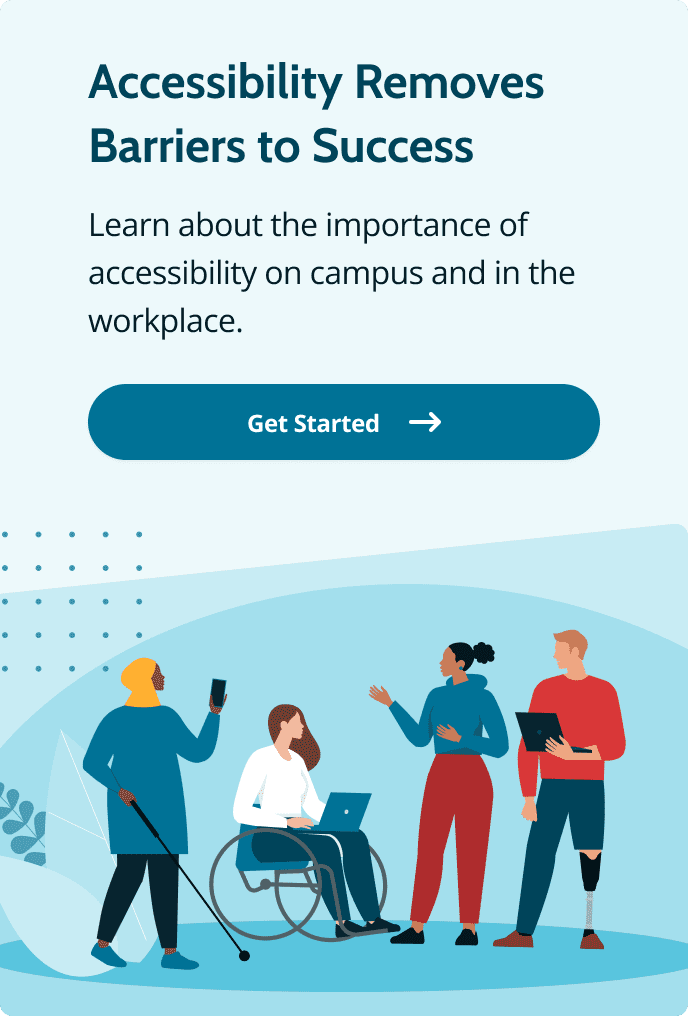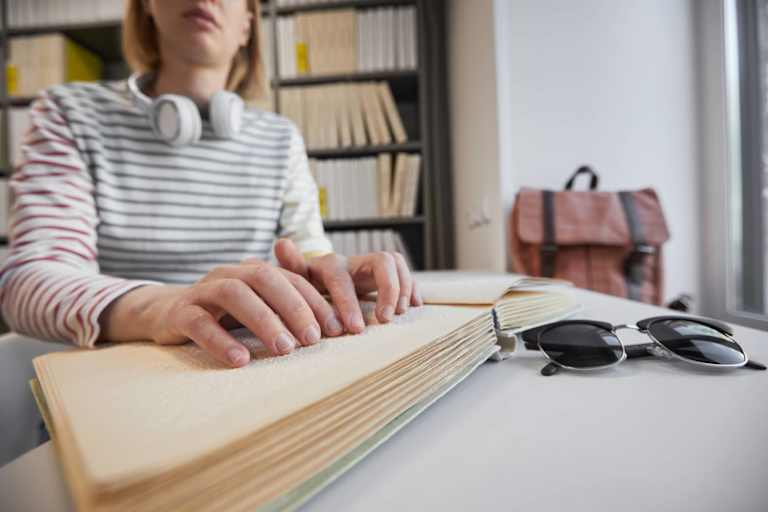What Accommodations Do Colleges Offer for Deaf and Hard of Hearing Students?
Figuring out how to access disability services can be daunting, especially as an incoming first year — but asking what accommodations are available is the best place to start.
When many people think of accommodations for Deaf and Hard of Hearing people, an American Sign Language (ASL) interpreter often comes to mind. However, not everyone in the Deaf or Hard of Hearing community knows or uses ASL. The good news is there are lots of other options available.
It’s important to understand your rights, request the support you need, and choose the right school as a Deaf student. By doing so, you can feel more confident in navigating your education and creating a supportive learning environment.
Advocating for Yourself
To advocate for yourself effectively, it is important to be aware of the laws that protect your rights while continuing your education.
Understanding how to request accommodations through your campus’s disability services office and how to address any issues or delays in obtaining those accommodations is crucial. By staying informed and taking appropriate action, you can ensure that your needs are met and that you receive the support necessary for a successful academic experience.
Because accommodation needs vary, it’s a good idea to register with your school’s disability office as soon as possible. Don’t be afraid to ask questions, and advocate for yourself if you believe you’re not receiving the right accommodations.
It’s also important to keep in mind that some schools — especially large universities — have separate offices for handling student accommodations in the classroom and managing accommodations for the public during general events on campus. If you are attending a public event on your school’s campus, don’t assume that your accommodation will automatically be available. Be sure to contact the event’s designated ADA person to request services and accommodations.
Legal Rights and Obligations
According to Section 504, students with disabilities have the right to extended time on tests, the use of recording devices, and sign language interpreters — depending on their disability. These accommodations level the playing field for students, and universities are obligated to provide them.
Accommodations for Deaf and Hard of Hearing Students
CART (Communication Access Real-Time Translation)
CART captioning is the instantaneous transcription of spoken words into text. It is also referred to as real-time captioning. CART captions are produced verbatim on a word-for-word basis. The captioner captions everything said in the classroom, as well as any environmental sounds and cues. This service allows students to follow along and participate in real-time.
Assistive Listening Devices (ALDs)
An ALD increases a student’s ability to hear in numerous situations, such as large, crowded, or noisy rooms. The speaker wears a microphone that transmits directly to the listener’s ear through headphones or other listening devices, such as hearing aids. Some classrooms and auditoriums contain permanent assistive listening systems.
Notetakers
Notetakers are student volunteers paid a stipend to take notes. These notes are made available to students with note-taking accommodations
C-Print and Typewell
C-Print and Typewell services provide meaning-for-meaning interpretations of what is said in a classroom. A typist listens to what a professor says and produces text that matches the professor’s meaning.
Captioned Media/Closed Captioning
Captioned media displays spoken words from television clips, webcasts, film clips, or short videos as text. It includes speaker identifications, sound effects, and music descriptions.
Augmentative and Alternative Communication Devices
Augmentative and alternative communication devices help students who cannot use verbal speech to communicate. These devices are helpful for one-on-one discussions and when an ASL interpreter is not present to verbalize for the student.
Test Modifications
Test modifications vary with each student’s needs. Some common examples include extended time for completing exams, individual rooms to avoid noisy distractions, and the use of devices for voicing answers and questions.
Preferred Seating
Preferred seating can be arranged so that Deaf or Hard of Hearing students can have a dedicated seat at the front of the class. This accommodation allows the student to be closer to the speaker so they may hear better, read lips, and/or pick up visual cues that the instructor makes.
It’s also important to note that accommodations are not one-size-fits-all. While ASL interpreting works for many Deaf students, you may prefer a combination of accommodations, such as CART and note-taking services alongside an ALD for larger classroom settings.

Choosing a School
Choosing a college can be a lengthy process, and it may feel even more complicated if you have concerns about accommodations. When considering the above accommodations, you should know that not every college can offer the same amount of support.
If there is an opportunity to visit the disability services office during a campus tour, make sure to take advantage of it. This will provide you with valuable insights into whether the college has the necessary resources and support systems in place to effectively accommodate Deaf students.
The staff and the faculty are there to help you learn and succeed, and they want and need to know what will benefit your learning journey. There is a lot of interest in making college more accessible for underrepresented groups. Oftentimes, the first step is simply making sure a school meets your learning needs.
Gallaudet University
Of the schools a student can choose from, Gallaudet University is one of the few in the United States that caters to a specific population of students with disabilities. The university is well-known for its history as a school for Deaf and Hard of Hearing students, and it is a premier institution for this population — with a campus, faculty, and courses engineered with them in mind.
Founded in 1864, Gallaudet University has operated for over 150 years. The university imagines a world in which students with disabilities receive equitable education and treatment from institutions of higher learning. Students interested in attending Gallaudet should visit the school’s website for additional information.
Disclaimer: The responses provided as part of the Ask a College Advisor series are for general informational purposes only. Readers should contact a professional academic, career, or financial advisor before making decisions regarding individual situations.





